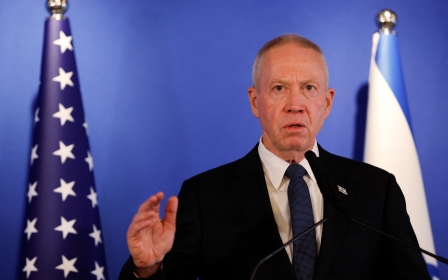Israel: Strikes rock country as judicial crisis deepens

Israel's president urged an immediate halt to controversial judicial reforms on Monday, while the head of the national trade union coalition called for a general strike following mass protests overnight.
The country's main Ben-Gurion airport is refusing to allow any planes to land or take off and the medical association said at least 600 doctors will refuse to work. Some 30,000 people were set to leave Israel on Monday, media reported.
Hundreds of thousands of Israeli protesters took the streets on Sunday night after Prime Minister Benjamin Netanyahu dismissed Defence Minister Yoav Gallant, a day after he called for highly controversial judicial reforms to be suspended.
Protesters blocked the main highway in Tel Aviv on Sunday night following the sacking, waving Israel flags and lighting a large bonfire in the middle of the road. Security forces used water cannons to disperse the crowds.
Rallies also took place Beersheeba, Haifa and Jerusalem, where demonstrators were confronted by police outside Netanyahu’s residence.
New MEE newsletter: Jerusalem Dispatch
Sign up to get the latest insights and analysis on Israel-Palestine, alongside Turkey Unpacked and other MEE newsletters
On Monday, Israeli President Isaac Herzog called on the government to halt the judicial overhaul in a statement on Twitter.
"For the sake of the unity of the people of Israel, for the sake of responsibility, I call on you to stop the legislative process immediately," he tweeted.
Later on Monday, Arnon Bar-David, the chair of Israel's Histadrut Labour Federation, called for a general strike if the legislation wasn't halted.
"I am calling a general strike," Bar-David said in a televised address, adding that "from the moment this press conference ends, the State of Israel stops".
Netanyahu planned an address on Monday which his office said had been delayed without giving explanation. Israeli media reported that the prime minister was expected to announce a freeze to the reforms.
Despite growing pressure to scrap the legislation, Netanyahu's coalition partners have threatened to collapse his government if the reforms aren't passed. Itamar Ben-Gvir, Israel's far-right national security minister, tweeted that the government must press ahead with the reforms and not "surrender to anarchy".
The proposed judicial reforms would give parliament both the power to override Supreme Court decisions through a simple majority vote, and de facto control over court nominees, a role currently held by a mixed panel of politicians, judges, and bar association members.
It would also limit the court's ability to overturn unconstitutional legislation.
MPs are set to vote on Monday on a central part of the government’s proposal, which would change the way judges are appointed.
At least two other Likud MPs tweeted their support for Gallant, underlining questions over whether the government could count on a majority if it pushed ahead with a vote. The coalition has a majority of just four MPs of 120.
The White House on Sunday said it was “deeply concerned” over events in Israel following Gallant’s sacking, calling for “the urgent need for compromise”.
Middle East Eye delivers independent and unrivalled coverage and analysis of the Middle East, North Africa and beyond. To learn more about republishing this content and the associated fees, please fill out this form. More about MEE can be found here.





